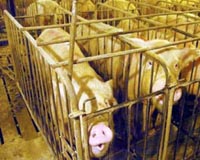 |
Washington DC (SPX) May 19, 2009 DNA analysis shows that Indonesian zebu cattle have a unique origin with banteng (Bos javanicus) as part of their ancestry. Throughout the world, cattle inhabit a range of climatically diverse environments: common taurine cattle, for example, are kept in temperate zones, zebus in hot, dry climates and yaks at the high altitudes of Tibet. A report published by the online, open-access, peer-reviewed journal PLoS ONE shows that another bovine species, the banteng, also made a genetic contribution to the ancestry of Indonesian cattle. The study, conducted by an international team of researchers, was led by Bambang Purwantara from the Bogor Agricultural University, Hans Lenstra and Ben Colenbrander from the Faculty of Veterinary Medicine, Utrecht University, and Goran Andersson from the Swedish University of Agricultural Sciences in Uppsala. Cattle from Bali were already known to be a domestic form of the banteng, a species which can remain very fertile in the tropical conditions it inhabits. On the sporadic occasions when a banteng mates with a zebu, the offspring are usually reproductively viable. In the PLoS ONE study, DNA analysis now shows that many of the famous 'racing bulls' from Madura descended from banteng cows, while the ancient Galekan cattle on East Java originally emerged from crosses between zebu bulls and banteng cows. The DNA of zebus on Sumatra also carries clear traces of banteng DNA. Banteng cows have therefore played an important role in the genetic ancestry of many Indonesian cattle. This shows the ingenuity of local breeders, who have made the best use of the available genetic resources and accomplished an adaptation of the Indian zebu to Indonesian conditions. The history and breeding of Indonesian cattle has resulted in a unique genetic resource that combines the general tolerance of zebu to tropical and dry climates with the adaptation of domestic banteng to Indonesian conditions and husbandry. The researchers report that the information in their study about the history and species composition could be of great use when making strategic choices regarding breed management and conservation. They also suggest that the adaptation of Indonesian cattle to different modes of management under tropical conditions may very well be exploited outside Indonesia, especially if the world's high temperature zones expand, as expected from current global climate trends. Share This Article With Planet Earth
Related Links Bogor Agricultural University/a> Public Library of Science Farming Today - Suppliers and Technology
 New York State Ponders Better Conditions For Farm Animals
New York State Ponders Better Conditions For Farm AnimalsAlbany NY (SPX) May 19, 2009 The Humane Society of the United States and Farm Sanctuary, headquartered in New York, announced enthusiastic support for legislation introduced in the New York State Assembly to provide more room for farm animals. The bill, A08163, introduced Tuesday by Assembly member Linda Rosenthal, D-Manhattan, prohibits confining breeding pigs, calves raised for veal, and egg-laying hens in cages tha ... read more |
|
| The content herein, unless otherwise known to be public domain, are Copyright 1995-2009 - SpaceDaily. AFP and UPI Wire Stories are copyright Agence France-Presse and United Press International. ESA Portal Reports are copyright European Space Agency. All NASA sourced material is public domain. Additional copyrights may apply in whole or part to other bona fide parties. Advertising does not imply endorsement,agreement or approval of any opinions, statements or information provided by SpaceDaily on any Web page published or hosted by SpaceDaily. Privacy Statement |